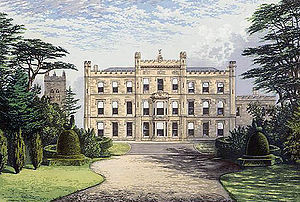Elvaston Castle
| Elvaston Castle | |
|---|---|

Elvaston Castle in the late 19th century
|
|
|
Location within Derbyshire
|
|
| General information | |
| Architectural style | Gothic Revival |
| Location | Elvaston, Derbyshire |
| Country | England, United Kingdom |
| Coordinates | 52°53′34″N 1°23′43″W / 52.89278°N 1.39528°WCoordinates: 52°53′34″N 1°23′43″W / 52.89278°N 1.39528°W |
| Construction started | 1815–1829 (Extended and Remodeled) |
| Completed | 1836 (Final Alterations Completed) |
| Owner |
Earl of Harrington Derbyshire County Council |
| Design and construction | |
| Architect | James Wyatt, Robert Walker, Lewis Nockalls Cottingham |
|
Listed Building – Grade II*
|
|
| Designated | 2 September 1952 - House 4 August 1984 - Park |
| Reference no. |
1334604 - Country House 1000404 - Park and Garden |
|
Listed Building – Grade II
|
|
| Number of Listings | 14 including Boat House, Coach House, Grotto and Moorish Temple |
Elvaston Castle is a stately home in Elvaston, Derbyshire, England. The Gothic Revival castle and surrounding parkland is run and owned by Derbyshire County Council as a country park known as, Elvaston Castle Country Park. The country park has 200 acres (0.81 km2) of woodlands, parkland and formal gardens.
The centrepiece of the estate is the Grade II* Listed Elvaston Castle. The castle has been neglected and has fallen into disrepair; due to its condition, the building is not open to the public, and since 2008 has been listed on the Buildings at Risk Register. Derbyshire County Council estimates the castle and estate requires at least £6.1 million of work and materials in essential repairs, with a maximum permitted overspend of 7% greater if it is decided to re-open the building to the public or sell it in repaired form.
Until the 16th century the estate was held by the Shelford Priory. After the Dissolution of the Monasteries the Crown sold the priory and its estates in 1538 to Sir Michael Stanhope of Rampton, Nottinghamshire.Sir John Stanhope (died 1611) granted the estate to his second son, also Sir John Stanhope (d .1638), High Sheriff of Derbyshire, in 1629.
The manor house was built for the latter Sir John in 1633. This Elizabethan-style house was redesigned and extended in a grand Gothic Revival style by James Wyatt in the early 19th century for the Charles Stanhope, 3rd Earl of Harrington. Wyatt designed a new wing, a new great hall, and most of the interiors of the castle, but died before work was completed. His designs were carried out by Robert Walker between 1815 and 1829.
...
Wikipedia

